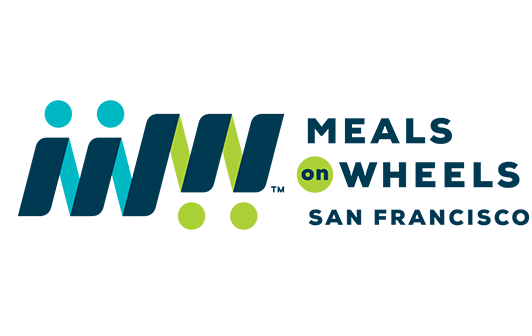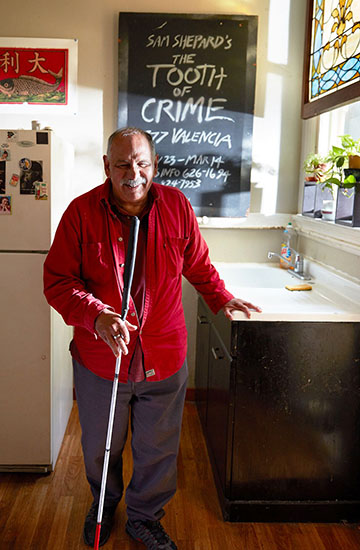
Meals on Wheels San Francisco

Meals on Wheels San Francisco (MOWSF) is more than just a food delivery service. Every day, its staff and volunteers provide a network of services that allow homebound seniors to continue to live in their homes with dignity and independence. By providing nutritious meals and daily safety checks, MOWSF reduces the effects of isolation, loneliness, depression and falls that many seniors experience. In 2018, the nonprofit delivered more than two million meals to 4,700 elderly citizens.
In order to meet the growing population of food insecure seniors in San Francisco, MOWSF recognized that it needed a software system that could help manage the complex logistics of operating programs at scale, across the city. In six months, with a set of solutions offered in Salesforce Nonprofit Cloud and an expert administrator, MOWSF has been able to rapidly create a platform to support its work and ensure that seniors are able to remain in their homes for as long as possible.
High-quality data informs effective client management…
 MOWSF vans are a familiar site across the city and many residents will have seen a driver park up, deliver a meal and, after checking in with the recipient, move on to their next stop. But, as Angelina Cahalan, MOWSF Salesforce administrator explains, behind this seemingly straightforward activity is a multitude of steps. The nonprofit had been using a combination of a web-based software platform, spreadsheets, paper files and paper-based notification systems to manage its complex program work. Recognizing that this system did not offer the tracking and logistics support or functionality it needed, MOWSF identified Salesforce as a viable partner.
MOWSF vans are a familiar site across the city and many residents will have seen a driver park up, deliver a meal and, after checking in with the recipient, move on to their next stop. But, as Angelina Cahalan, MOWSF Salesforce administrator explains, behind this seemingly straightforward activity is a multitude of steps. The nonprofit had been using a combination of a web-based software platform, spreadsheets, paper files and paper-based notification systems to manage its complex program work. Recognizing that this system did not offer the tracking and logistics support or functionality it needed, MOWSF identified Salesforce as a viable partner.
As a first step, MOWSF uses a combination of standard and customized objects in the Nonprofit Success Pack, to manually create detailed records about individual clients. In addition to basic information, such as name and address, the client record contains nutritionist and social worker assessments, and a meal schedule based on assessed needs. Some clients, for example, may have a temporary suspension on file if they are in the hospital, which is important for informing daily delivery requirements. MOWSF tracks client demographics and funding sources, for billing and grant writing purposes. “There are even individual notes to help the driver,” says Cahalan, “for example, a specific way of knocking so that vulnerable seniors can be confident that they are opening the door to a MOWSF driver and not a stranger.”
Some activities are managed in Process Builder, to automatically generate next steps, such as a social worker assessment. Others are currently manually written in complex code, but Cahalan hopes that much of this can be migrated into standard Salesforce functionality to further simplify processes.
Similarly, some activities are undertaken manually, for example, a nutritionist assessment, and entered into Salesforce using the Apsona application. This very likely reflects the generational concern that seniors may have about larger mobile devices, such as laptops. MOWSF is exploring the idea of tablets and a questionnaire in Form Assembly, to allay some of these concerns while making the data collection process more efficient.
…complex execution…
Cahalan has worked hard to ensure that accurate client records form the platform upon which MOWSF can manage its programs. Its flagship work, the Home Delivered Meal program, is the only initiative in the city that provides two meals a day, seven days a week. To execute this program successfully every day, MOWSF staff need to coordinate their 35 drivers to deliver meals to 3,300 people spread out across different parts of the city. By pulling in information from objects across client records, MOWSF is able to distill complex information into a straightforward driver delivery list. The driver can now access this list on their mobile device via an app that delivers pertinent client and delivery information, arranged by route. The switch from paper-based lists to mobile technology has allowed drivers to record information about individual clients in real-time, such as safety concerns or non-delivery. These data are automatically entered into Salesforce, are connected to the client record, and can quickly trigger follow up actions, such as a case for the MOWSF Safety Board if there is a concern about client safety.
Other programs managed in Nonprofit Cloud include: “Adopt a Building” where MOWSF arranges for meals to be delivered and distributed to named residents of a specific building, by corporate volunteers from nearby companies; “Good Neighbor” where MOWSF volunteers deliver needed items and services to seniors that have been identified by drivers or social workers; and “Home Delivered Grocery”, a partnership with the San Francisco Marin Food Bank, in which volunteers pack and deliver grocery bags for 330 seniors weekly.
…and engaged volunteers…
These programs are managed by MOWSF staff and executed by volunteers, who collectively in 2018, logged in 21,000 hours. Recruiting, onboarding, placement and scheduling of volunteers is all managed via Volunteers for Salesforce. Individuals can express interest in getting more involved using the web form on MOWSF’s homepage. If they indicate that they want to find out more about a particular program, this generates a campaign to convert the prospective volunteer into a signed-up participant, and opens a record in Volunteers for Salesforce. MOWSF can continue to communicate with volunteers through emails generated in the system.
…which has led to exponential efficiency gains.
Managing all programs in Salesforce, with information in a single location that staff can access in the office and out in the field, has “exponentially increased MOWSF’s day to day operating efficiency”, says Meredith Terrell, Senior Director of Home Delivered Meals and Volunteers. For example, Salesforce technology has halved the time it takes to invoice the city of San Francisco for services it contracts out to MOWSF. Migrating volunteer management into Salesforce has saved around 20 hours per week in staff time, hours that can be invested in deeper client support and program management.
Nonprofit Cloud offers exciting opportunities ahead
Having used Salesforce to manage its volunteers for two years, MOWSF was able to rapidly ramp up its use of the platform for program management, in less than six months. Of its 80 staff, 41 are Salesforce users. MOWSF is now in a position to explore the benefits of Reports & Dashboards to inform program effectiveness and impact. Indeed, the Social Work and Nutrition departments already use Reports as a way of seeing which clients are due for an assessment.
Looking ahead, Cahalan is excited about MOWSF’s robust client data informing grant submissions and marketing communications. Staff are exploring how they might use Form Assembly to generate sign-in lists for volunteer shifts and link those to the volunteer’s record in Salesforce, so that MOWSF can collect more robust data about volunteer engagement. There may also be opportunities to roll out Salesforce to other parts of the organization, such as fundraising and marketing, as MOWSF continues its journey forward towards becoming a connected nonprofit, and ensures that no senior is left behind.